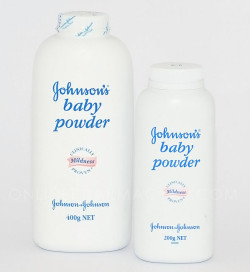 Johnson and Johnson baby powder contains talc, a natural substance made of magnesium, silicon and oxygen. When ground, talc is an absorbent substance that is so smooth it reduces friction when applied.
Johnson and Johnson baby powder contains talc, a natural substance made of magnesium, silicon and oxygen. When ground, talc is an absorbent substance that is so smooth it reduces friction when applied.
Because of its ability to absorb moisture and reduce friction, talc is widely used in Johnson and Johnson baby powder, adult body powder, facial powders and other cosmetics.
In nature, talc sometimes contains asbestos, which is a known carcinogen. All talc used in consumer products has been purified so that any trace of asbestos has been removed.
Even talcum products used in construction materials for houses have been free of asbestos since the 1970s.
But talc use is still not always safe. The two cancers most possibly linked to talcum powder are lung cancer and ovarian cancer.
Talc and Lung Cancer
Talc miners and millers have been studied to find out if they have an increased risk of lung cancer and other respiratory diseases. The results are conflicting because there is no getting around the fact that talc in its natural form can contain asbestos and other minerals.
Talc miners encounter talc before it is purified. They can also be exposed to other substances such as radon, which also can affect lung cancer risk.
Talc and Ovarian Cancer
For years, women have used Johnson and Johnson baby powder to help stay feeling fresh. Women add it directly onto feminine pads to control odor. Runners often use baby powder on the inner thighs to prevent chafing. Others might apply it to the inner thighs to reduce friction, and genital area as well.
While ovarian cancer is a relatively rare cancer, it is oftentimes fatal.
Harvard professor Dr. Daniel W. Cramer compared 215 women with ovarian cancer with 215 healthy women who were considered the control group.
He found that women who used baby powder were nearly twice at risk for having ovarian cancer. He also determined that women who used talcum powder on their genitals and on feminine napkins were more than three times at risk.
That Harvard study was done in 1982, and since then, nearly a dozen other studies have confirmed those results.
Dr. Steven A. Narod, a cancer genetics expert from Toronto, said that when researchers combined studies of 20,000 women, talcum powder was seen to pose a 24% risk in ovarian cancer.
He explained that if the numbers are true, then for every five or six baby powder users who develop ovarian cancer, one could be because of talcum powder.
How Could Johnson and Johnson Baby Powder Cause Cancer?
In 1971, researchers in Wales found talc particles embedded in ovarian and cervical tumors. It is believed that talc crystals creep up the genitourinary tract and into the peritoneal cavity. The ovaries are open-ended in the peritoneal cavity, and the talc crystals settle in there and cause irritation.
Some scientists believe that talc particles simply cause inflammation, which is one factor believed to play a major role in the development of ovarian cancer.
However, when research in the 1990s started to indicate a correlation between talc and ovarian cancer, no products were recalled, nor were warning labels mandated.
The FDA faced a petition from the Cancer Prevention Coalition in 1994 and again in 2008 when the nonprofit agency was trying to convince the FDA to add talc warning labels.
In refusing these demands, the FDA says there is “no conclusive evidence” that talc causes ovarian cancer.
Still, the FDA did concede that talc “may elicit a foreign-body-type reaction and inflammatory response that, in some exposed women, may progress to epithelial cancers.”
If you or someone you know has used Johnson and Johnson baby powder or other talcum powder products and subsequently developed ovarian cancer, you could have a case against the manufacturer of the talc product.
Do YOU have a legal claim? Fill out the form on this page now for a free, immediate, and confidential case evaluation. The attorneys who work with Top Class Actions will contact you if you qualify to let you know if an individual lawsuit or class action lawsuit is best for you. [In general, baby powder cancer lawsuits are filed individually by each plaintiff and are not class actions.] Hurry — statutes of limitations may apply.
ATTORNEY ADVERTISING
Top Class Actions is a Proud Member of the American Bar Association
LEGAL INFORMATION IS NOT LEGAL ADVICE
Top Class Actions Legal Statement
©2008 – 2025 Top Class Actions® LLC
Various Trademarks held by their respective owners
This website is not intended for viewing or usage by European Union citizens.
Get Help – It’s Free
Join a Free Baby Powder Cancer Class Action Lawsuit Investigation
If you used Johnson’s Baby Powder, Shower to Shower, or another talcum powder product and were diagnosed with ovarian cancer, you may have a legal claim. Family members of loved ones who died of ovarian cancer can also join. Submit your information now for a free case evaluation.
An attorney will contact you if you qualify to discuss the details of your potential case at no charge to you.
Please Note: If you want to participate in this investigation, it is imperative that you reply to the law firm if they call or email you. Failing to do so may result in you not getting signed up as a client, if you qualify, or getting you dropped as a client.












